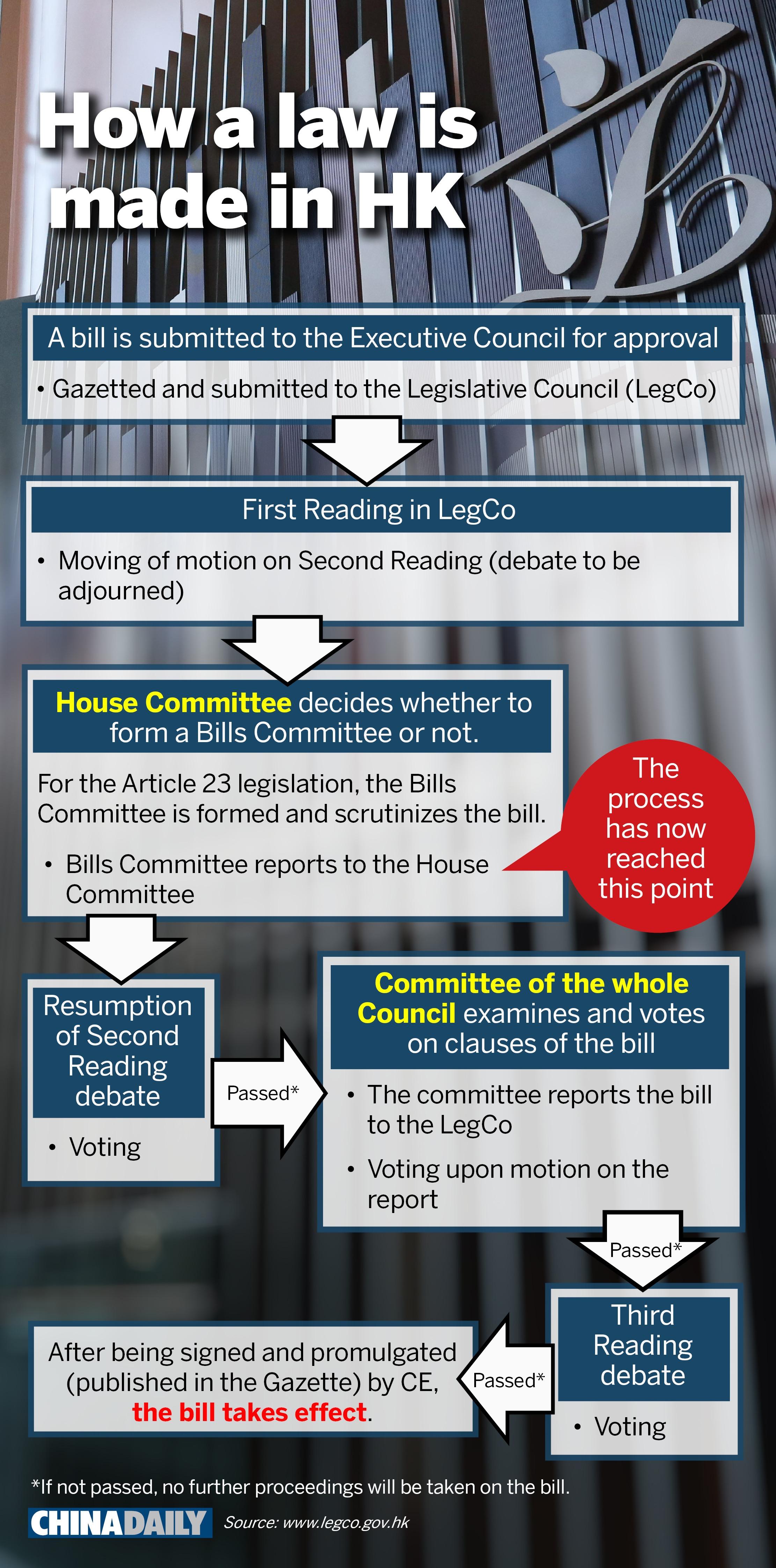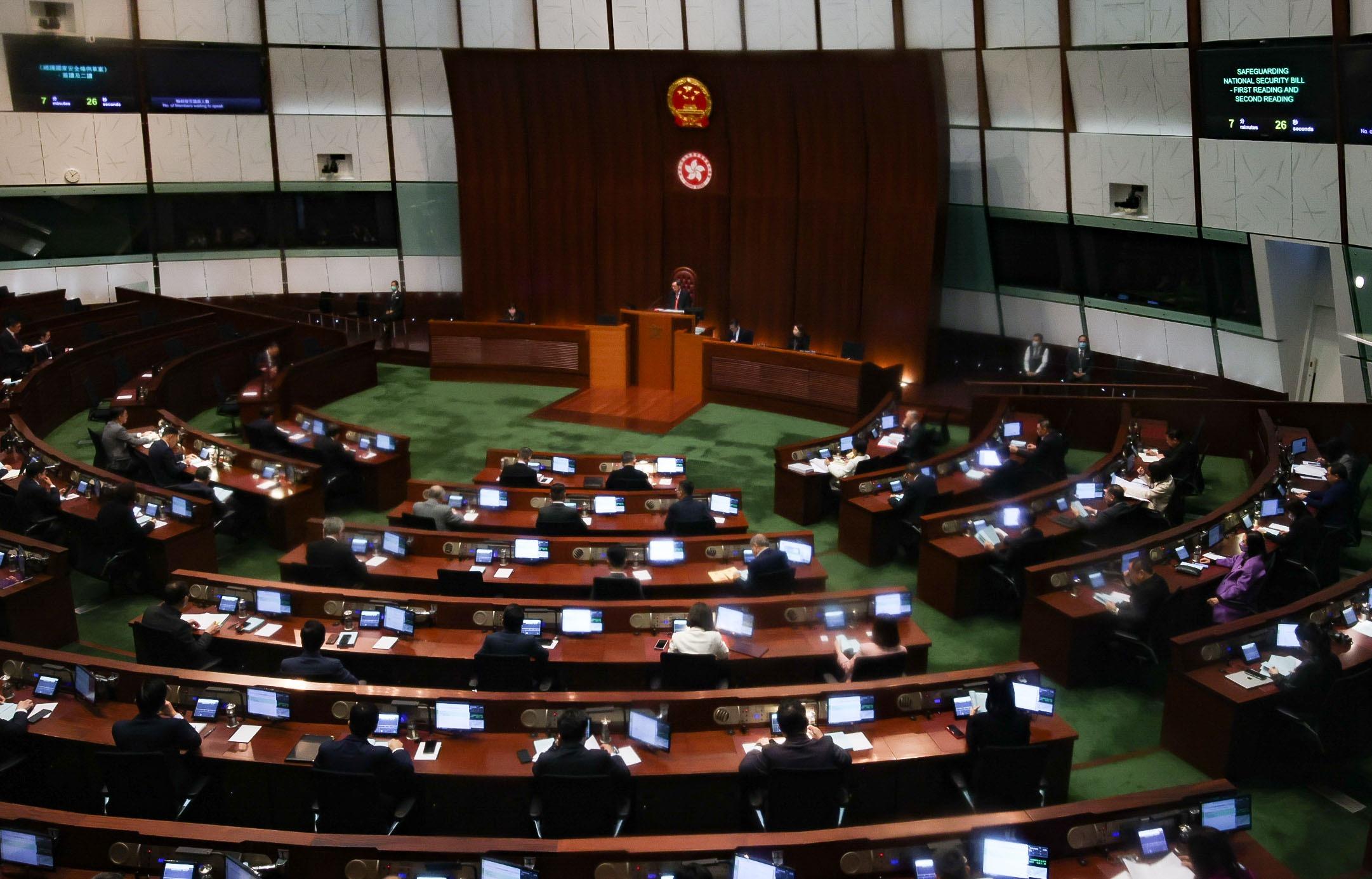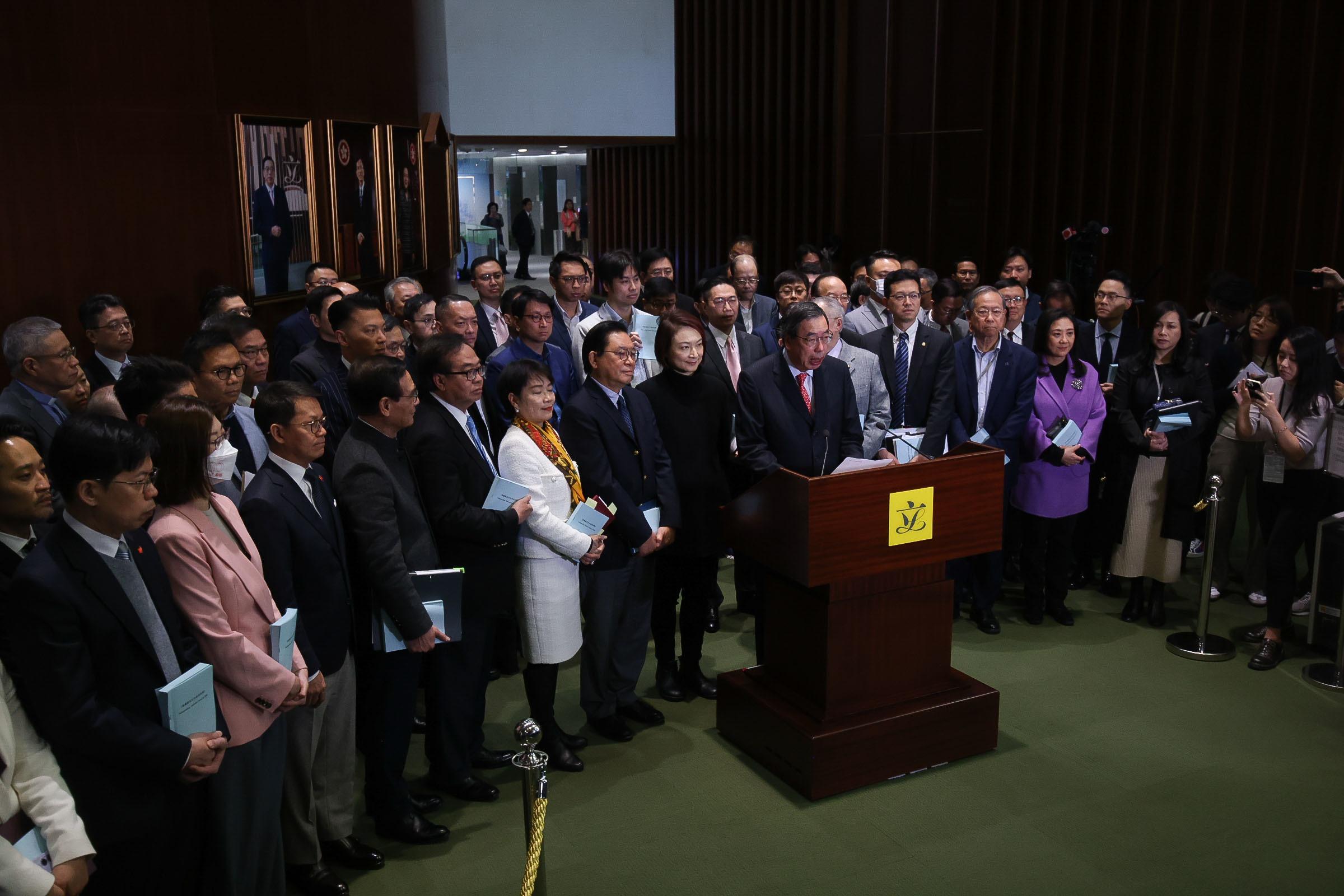
The Hong Kong Special Administrative Region government gazetted its bill on Basic Law Article 23 national security legislation on Friday, with a full Legislative Council meeting scheduled the same day for its first and second readings to scrutinize the bill clause by clause.
The ordinance proposes a maximum sentence of life imprisonment for treason, while insurrection and some other offenses will incur a penalty of 10 years’ imprisonment if foreign collusion is proved.
READ MORE: Ding calls to speed up Article 23 legislation
The 212-page draft of the new piece of legislation, named the Safeguarding National Security Ordinance, was published nine days after the conclusion of a month-long public consultation exercise on the legislative proposals.
The HKSAR has to enact the Basic Law Article 23 legislation as soon as possible – the earlier the better.
John Lee Ka-chiu, Chief Executive, HKSAR
Chief Executive John Lee Ka-chiu on Thursday said he had written to LegCo president Andrew Leung Kwan-yuen, urging the legislature to vet the bill at full speed.
"The HKSAR has to enact the Basic Law Article 23 legislation as soon as possible – the earlier the better,” the CE said in a statement.
“The HKSAR can then focus its efforts on developing the economy, improving people's livelihood and maintaining the long-term prosperity and stability of Hong Kong,” he added.
Leung informed lawmakers that he was convening a full council meeting at 11 am on Friday for the bill's first and second readings, citing the matter's urgency and necessity.
Earlier, lawmakers formed a subcommittee to study matters relating to Article 23, deciding that the subcommittee would be turned into a bills committee once the bill is submitted to LegCo.
 Hong Kong lawmakers take part in reading the draft of the Safeguarding National Security Ordinance at the Legislative Council in Hong Kong on March 8, 2024. (CALVIN NG / CHINA DAILY)
Hong Kong lawmakers take part in reading the draft of the Safeguarding National Security Ordinance at the Legislative Council in Hong Kong on March 8, 2024. (CALVIN NG / CHINA DAILY)
The government conducted a public consultation from Jan 30 to Feb 28 this year.
The bill comprises nine chapters, including treason; insurrection, incitement to mutiny and disaffection, and acts with seditious intention; offences in connection with state secrets and espionage; sabotage endangering national security; external interference and organizations engaging in activities endangering national security; enforcement powers and procedure in legal actions in connection with safeguarding national security; mechanisms for safeguarding national security and relevant protections.
The bill suggests the conditions of specified disclosure of State secretes, when the purpose of making the disclosure is to reveal circumstances in which government performance of its functions in accordance with the law is seriously affected, or there is a serious threat to public order, public safety or public health; and if the disclosure of such information “manifestly outweighs” the public interest served by not making the disclosure.
ALSO READ: Article 23 legislation FAQs: Separating fact from fiction
However, the law will also consider whether the person has taken any other practicable step in place of the disclosure before disclosing such information.
The draft bill also proposes that a magistrate may issue a warrant to extend the detention of suspects beyond the usual 48 hours to 14 days, and authorize the police to restrict the person from consulting a lawyer within 48 hours of police custody.
 This photo taken on March 8, 2024, shows public consultation booklets for Basic Law Article 23 legislation, in Hong Kong. (CALVIN NG / CHINA DAILY)
This photo taken on March 8, 2024, shows public consultation booklets for Basic Law Article 23 legislation, in Hong Kong. (CALVIN NG / CHINA DAILY)
Maximum penalties
According to the draft, life imprisonment may be imposed on those who are found guilty of treason, insurrection, incitement of members of Chinese armed forces to mutiny, collusion with an external force to damage or weaken public infrastructure with an intent to endanger national security.
Treason
Those who publicly manifest intention to commit the offense of treason will be liable for imprisonment for 14 years.
Failure to provide information on others’ acts of treason knowingly will also be liable for 14 years imprisonment.
Unlawful military drilling is liable on conviction to imprisonment for seven years.
Insurrection
Assisting members of the Chinese armed forces to abandon duties or go absent without leave is liable on conviction to imprisonment for seven years. The penalty will be increased to 10 years if foreign collusion is involved.
ALSO READ: Article 23: HK mulls higher penalty for foreign collusion
The penalty is also applied to those who incite a public officer to abandon upholding the Basic Law and abandon allegiance to the HKSAR or incite any of the personnel of any of the offices of the central authorities in Hong Kong to abandon their duties and abandon their allegiance to China.
Seditious intention
Acts with seditious intention, including uttering a word that has a seditious intention, doing such acts or importing a publication and knowingly printing, publishing, selling, offering for sale, distributing, displaying or reproducing such seditious publications, is liable to seven years in jail, 10 years if external force is involved.
 LegCo President Andrew Leung Kwan-yuen (center, on the dais) speaks to the media after a LegCo meeting to scrutinize the bill on Basic Law Article 23 legislation, on March 8, 2024, in Hong Kong. (CALVIN NG / CHINA DAILY)
LegCo President Andrew Leung Kwan-yuen (center, on the dais) speaks to the media after a LegCo meeting to scrutinize the bill on Basic Law Article 23 legislation, on March 8, 2024, in Hong Kong. (CALVIN NG / CHINA DAILY)
State secrets
Unlawful acquisition of State secrets is liable to imprisonment for five years, while unlawful possession of State secrets may incur three years in jail.
Unlawful possession of state secrets when leaving HKSAR is liable to seven years imprisonment.
Unlawful disclosure of state secrets is liable on conviction to imprisonment for 10 years.
Unlawful disclosure of information etc. acquired by espionage may incur 10 years imprisonment.
Unlawful disclosure of information etc. that appears to be confidential matter is subject to five years in jail and seven years if external force has a role to play.
Espionage
Espionage on conviction is liable to imprisonment of 20 years.
Anyone entering prohibited places without lawful authority could be sentenced to two years in prison.
Participating in or supporting external intelligence organizations, or accepting advantages offered by them may incur imprisonment for 14 years.
Sabotage
Sabotage endangering national security, on conviction, is liable to imprisonment for 20 years; the sentence will be life imprisonment if an external force is involved.
External interference, activities endangering national security
External inference, on conviction, is liable to 14 years imprisonment.
Participation in activities of prohibited organizations may incur a fine of HK$1 million ($128,000) and imprisonment for 14 years.
Allowing meetings of prohibited organizations to be held on premises is liable to a fine of HK$250,000 and to imprisonment for seven years. The same penalty will be incurred for inciting others to become members of prohibited organizations and procuring subscription or aid for prohibited organizations.


